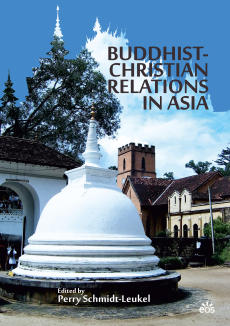Buddhist-Christian Relations in Asia
Religious Studies Scholar and Theologian Perry Schmidt-Leukel Publishes Compendium on Buddhists and Christians in Asia.

The relations between Buddhists and Christians in Asian countries shaped by Buddhism are at the center of a new publication edited by Professor Perry Schmidt-Leukel, a religious studies scholar and Anglican theologian working in the Cluster of Excellence “Religion and Politics”. The volume has just been published by EOS Editions as “Buddhist-Christian Relations in Asia”. It is based on the papers of a conference by the European Network of Buddhist-Christian Studies which was held on the same topic in 2015 and has been essentially designed by Professor Schmidt-Leukel. “In Asia, the relationships between Buddhism and Christianity differ significantly from what we find in the West, because in Asia Christians are a minority living among a Buddhist majority,” the scholar explains.
According to Schmidt-Leukel, cohabitation of Christians and Buddhists in Asia is not without its own problems. In a number of Asian countries the negative experiences from the Christian colonial times are still having their impact on the current situation and strain the relationship between the two faiths. Though this is markedly different in South-Korea, where the colonial power has been a Buddhist nation, Japan, so that Christians were able to present themselves as defenders of national sovereignty. “Presumably this is one of the reasons why only in Korea Christianity, in terms of numbers, was comparatively successful,” says Schmidt-Leukel. In many Asian countries, national and religious identity have formed a close symbiosis. “If being-Thai or being-Burmese is viewed as identical to being-Buddhist Christians are in serious difficulties.” Here the problems on integrating the religious stranger reappear in reverse relation.
A Broadly Conceived Comparison
For the first time this compendium deals with Christian-Buddhist relations in six different Asian countries: the three Theravāda Buddhist countries Sri Lanka, Thailand and Myanmar, and the three Mahāyāna Buddhist countries Japan, Korea and China. Three chapters are devoted to each of these countries. In each case an introductory chapter provides an overview on the history and the current state of the relationships between the two religious communities in the respective country, followed by two further chapters presenting more personal views from the perspective of a Christian and a Buddhist who are actively involved in local inter-faith dialogue. According to Schmidt-Leukel, “this analogues structure in the treatment of the individual countries enables a comparative perspective.” This is put in a larger context by the summaries and conclusions given in Schmidt-Leukel’s introductory chapter and in the Postscript written by the theologian and religious studies scholar Professor John D’Arcy May (retired from Trinity College, Dublin) who earned his doctorate from the University of Münster in 1975.
According to the editor, the contributions to this volume show that similar issues and doctrinal questions arise in each of the six countries. Yet the readiness to engage with such questions and the impact that the specific relationships between the two faith communities have on these issues vary significantly. Yet, it is not uncommon to find that Buddhism in Asia is far less open for the religious other than it is usually assumed in the West. But Christians in Asia too have often difficulties to overcome a hostile attitude to other religions. “The book deals with both, the obstacles but also the positive opportunities of an open and constructive dialogue.”
At the Cluster of Excellence, Professor Perry Schmidt-Leukel is head of the project C2-16 “Interreligious Theology.” He is a member of the interconnecting platform „Transcultural Entanglements“ and of the Coordinated Project Group “Exchange among and between ‘world religions’: appropriation – transformation – demarcation”. (exc/ill)

